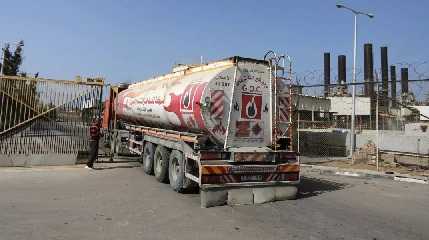
15 November 2023; MEMO: The first truck carrying fuel into Gaza since the start of Israel’s genocidal war on the Strip today crossed from Egypt to deliver diesel to the United Nations, though it will do little to alleviate shortages that have hampered relief efforts, Reuters reports.
The delivery was made possible by Israel giving its approval for 24,000 litres (6,340 gallons) of diesel fuel to be allowed into Gaza for UN aid distribution trucks, though not for use at hospitals, according to a humanitarian source.
“This is only 9% of what we need daily to sustain lifesaving activities,” Tom White, director of UN relief agency UNRWA in Gaza, posted on social media platform X. He confirmed that just over 23,000 litres, or half a tanker, had been received.
The first truck carrying fuel into Gaza since the start of Israel’s genocidal war on the Strip today crossed from Egypt to deliver diesel to the United Nations, though it will do little to alleviate shortages that have hampered relief efforts, Reuters reports.
The delivery was made possible by Israel giving its approval for 24,000 litres (6,340 gallons) of diesel fuel to be allowed into Gaza for UN aid distribution trucks, though not for use at hospitals, according to a humanitarian source.
“This is only 9% of what we need daily to sustain lifesaving activities,” Tom White, director of UN relief agency UNRWA in Gaza, posted on social media platform X. He confirmed that just over 23,000 litres, or half a tanker, had been received.
“Our entire operation is now on the verge of collapse,” said UNRWA Director Philippe Lazzarini. “It is appalling that fuel continues to be used as a weapon of war.”
Aid workers say a lack of fuel, which is needed for hospital generators, provision of water, sewage treatment and communications as well as for the distribution of relief, has contributed to a sharp deterioration of conditions for Gaza’s 2.3 million residents.
Limited deliveries of humanitarian aid have been crossing from Egypt into Gaza since 21 October, but Israel had refused to allow in fuel since 7 October.
The United Nations had warned in recent days that it would soon have to halt humanitarian operations as its fuel stocks became fully depleted.
It said fuel shortages had already caused or contributed to the closure of hospitals, bakeries, sewage pumping stations, water desalination plants and water wells, and were threatening to shut down telecoms data centres and connection points within 48 hours.
The initial delivery of 24,000 litres of fuel was intended to be split over two days, with 12,000 litres allocated for each day, an international source with knowledge of the operation said.
“This is not enough for anything – not for hospitals, not even for aid deliveries,” said the source, speaking on condition of anonymity. “It’s meant to be enough only to bring some of the aid that has been outside – and got rained on for example – indoors to the warehouses.”
Yesterday 91 trucks carrying food, medicine, bottled water, blankets and tents entered Gaza from Egypt, but the UN says deliveries since 21 October – 1,187 trucks in total – can only meet a fraction of needs. Distribution of the aid had largely come to a halt because of lack of fuel, it said.
After the first truck carrying fuel entered Egypt’s Rafah crossing headed for Gaza today, witnesses said two other trucks were lined up on the Egyptian side, but it was unclear when they might enter.




